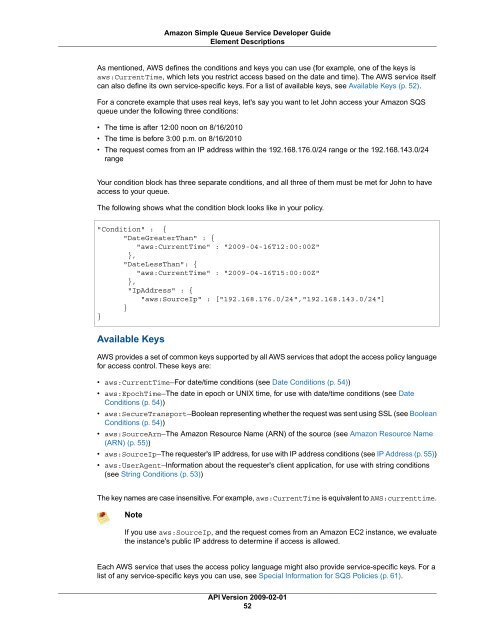You also want an ePaper? Increase the reach of your titles
YUMPU automatically turns print PDFs into web optimized ePapers that Google loves.
Amazon Simple Queue Service Developer Guide<br />
Element Descriptions<br />
As mentioned, AWS defines the conditions and keys you can use (for example, one of the keys is<br />
aws:CurrentTime, which lets you restrict access based on the date and time). The AWS service itself<br />
can also define its own service-specific keys. For a list of available keys, see Available Keys (p. 52).<br />
For a concrete example that uses real keys, let's say you want to let John access your Amazon SQS<br />
queue under the following three conditions:<br />
• The time is after 12:00 noon on 8/16/2<strong>01</strong>0<br />
• The time is before 3:00 p.m. on 8/16/2<strong>01</strong>0<br />
• The request comes from an IP address within the 192.168.176.0/24 range or the 192.168.143.0/24<br />
range<br />
Your condition block has three separate conditions, and all three of them must be met for John to have<br />
access to your queue.<br />
The following shows what the condition block looks like in your policy.<br />
"Condition" : {<br />
"DateGreaterThan" : {<br />
"aws:CurrentTime" : "<strong>2009</strong>-04-16T12:00:00Z"<br />
},<br />
"DateLessThan": {<br />
"aws:CurrentTime" : "<strong>2009</strong>-04-16T15:00:00Z"<br />
},<br />
"IpAddress" : {<br />
"aws:SourceIp" : ["192.168.176.0/24","192.168.143.0/24"]<br />
}<br />
}<br />
Available Keys<br />
AWS provides a set of common keys supported by all AWS services that adopt the access policy language<br />
for access control. These keys are:<br />
• aws:CurrentTime—For date/time conditions (see Date Conditions (p. 54))<br />
• aws:EpochTime—The date in epoch or UNIX time, for use with date/time conditions (see Date<br />
Conditions (p. 54))<br />
• aws:SecureTransport—Boolean representing whether the request was sent using SSL (see Boolean<br />
Conditions (p. 54))<br />
• aws:SourceArn—The Amazon Resource Name (ARN) of the source (see Amazon Resource Name<br />
(ARN) (p. 55))<br />
• aws:SourceIp—The requester's IP address, for use with IP address conditions (see IP Address (p. 55))<br />
• aws:UserAgent—Information about the requester's client application, for use with string conditions<br />
(see String Conditions (p. 53))<br />
The key names are case insensitive. For example, aws:CurrentTime is equivalent to AWS:currenttime.<br />
Note<br />
If you use aws:SourceIp, and the request comes from an Amazon EC2 instance, we evaluate<br />
the instance's public IP address to determine if access is allowed.<br />
Each AWS service that uses the access policy language might also provide service-specific keys. For a<br />
list of any service-specific keys you can use, see Special Information for SQS Policies (p. 61).<br />
API Version <strong>2009</strong>-<strong>02</strong>-<strong>01</strong><br />
52

















